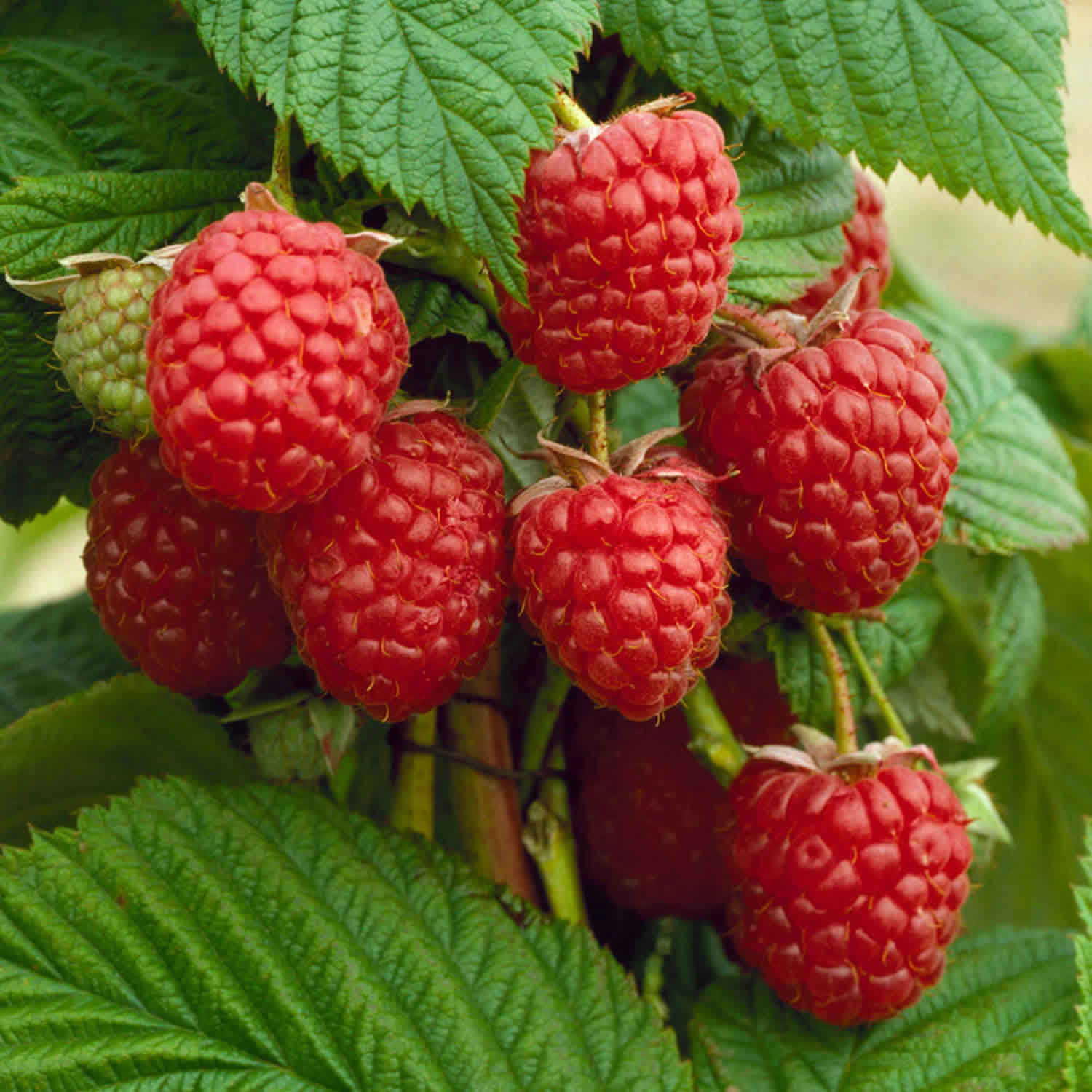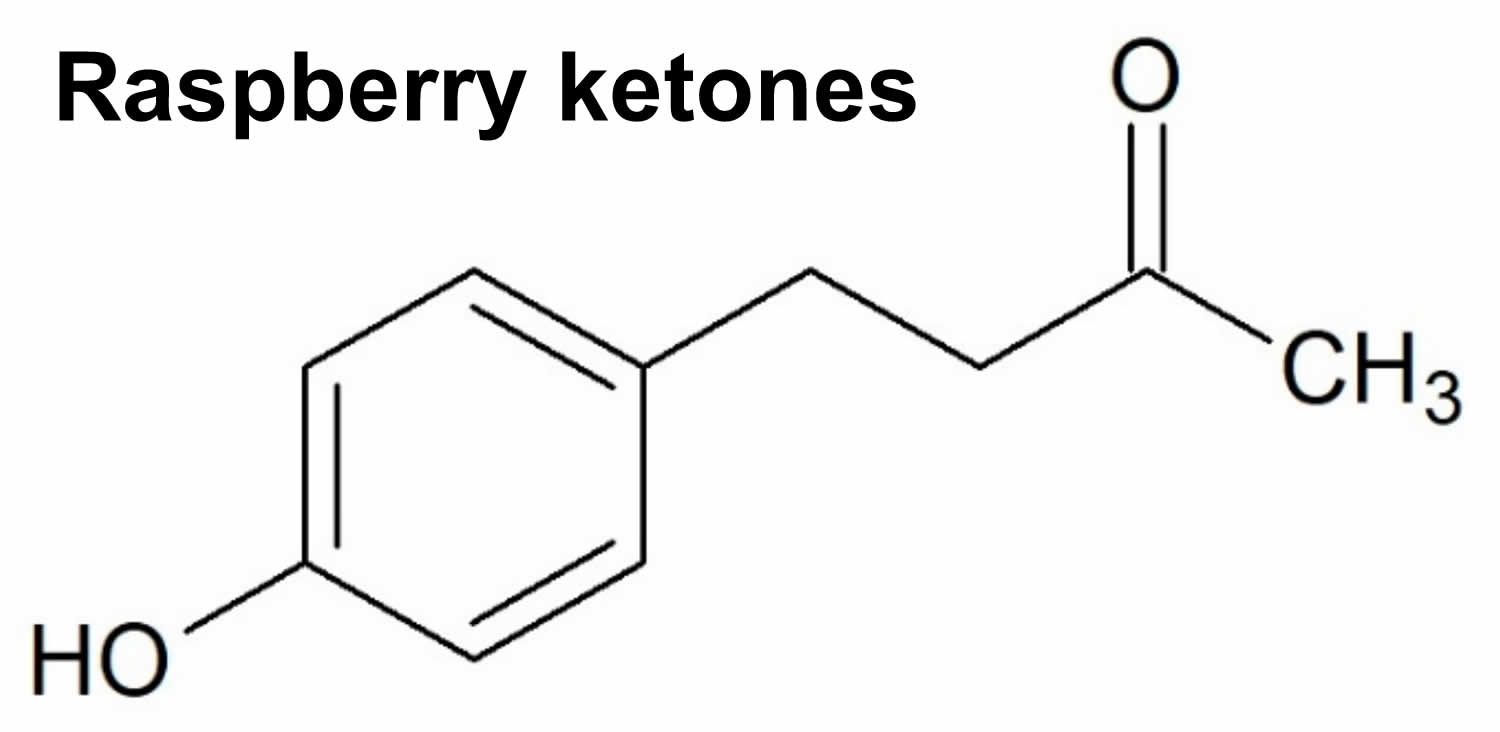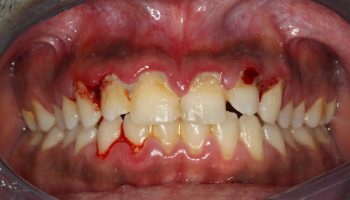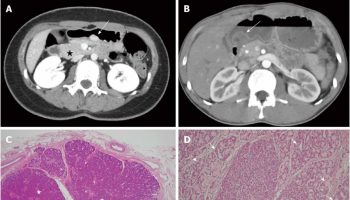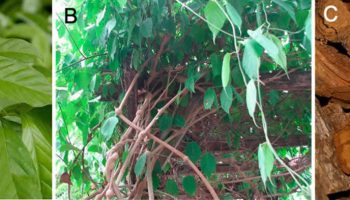What are raspberry ketones
Raspberry ketones also known as rheosmin, are naturally occurring antioxidant chemicals isolated from red raspberries (Rubus ideaus) (up to 4.3 mg/kg) with wide applications as food flavoring additive and marketed as a weight loss agent and an appetite suppressant 1. The chemical structures of raspberry ketones are 4-(4-hydroxyphenyl)-2-butanone or 4-(4-Hydroxyphenyl) butan-2-one, is recognized as the primary compound responsible for the characteristic raspberry flavor, is similar to the structures of capsaicin and synephrine, which are responsible for its anti-obesity actions and alteration of lipid metabolism 2. The amount of raspberry ketone [4-(4-hydroxyphenyl)-2-butanone], was found to be 3 times higher in wild berries than in cultivated varieties 3. Raspberry ketone [4-(4-hydroxyphenyl)-2-butanone] is synthetized in red raspberries (Rubus ideaus) by condensation of p-coumaroyl-CoA with malonyl-CoA and successive reduction 4. In addition, raspberry ketone is a U.S. Food and Drug Administration (FDA) designated generally recognized as safe (GRAS) additive, which has been widely used since the 1920s in the perfumery, cosmetics, insect attractant and food industry to impart raspberry aroma 5. Due to its low abundance in nature, fruit- derived raspberry ketone is among the most expensive natural flavor compounds with an estimated market value up to $20,000/kg, therefore synthetic sources of raspberry ketone are readily available 6. Raspberry ketone can also be synthesized chemically, but this product cannot be labeled as a natural flavor 7. Additionally, “natural” raspberry ketone is produced via microbial synthesis 8. Of note, natural raspberry ketone is not extracted from raspberries, which have very low raspberry ketone content. Natural sources include peaches, grapes, apples, rhubarb, lips (labellum) of orchid flowers, brewed coffee (Coffea arabica L.), kiwi berry (Actinidia arguta Planch. ex Miq.) and the bark of trees such as yew, maple, and pine 9.
Raspberry ketone [4-(4-hydroxyphenyl)-2-butanone] is structurally similar to synephrine and capsaicin (Figure 1) 10. Synephrine, a sympathomimetic, is used in dietary supplements for weight loss to replace ephedrine, which was banned by the FDA because of cardiovascular toxicity 11. Capsaicin is a component of cayenne pepper and is used topically for myalgia and sold under a number of names. Capsaicin also has sympathomimetic activity and has generated sporadic reports of cardiovascular toxicity 12.
Research on raspberry ketone is scant. A study in mice fed a high-fat diet and raspberry ketone (2% of total diet) showed that raspberry ketone prevented weight gain and elevation of liver and adipose tissue weight, which the authors attributed to increased norepinephrine-induced lipolysis in white adipocytes 10. A study conducted decades earlier reported no effects on the body weight of rats given raspberry ketone 100 mg/kg, a dose up to 200 times greater than the estimated dietary intake in humans 13. Test tube research suggests that raspberry ketone might increase secretion of adiponectin, which is involved in lipid and glucose metabolism and in body weight 2.
Other animal and test tube research suggests that raspberry ketone may protect against nonalcoholic steatohepatitis 14, increase skin insulin-like growth factor-1 (which is involved in promoting hair growth and increasing skin elasticity) 15 and possess antiandrogenic 16 , anti-inflammatory 17, antimelanogenic (skin lightening) activity 18. Very preliminary research in humans (< 15 subjects) suggests that topical application of raspberry ketone might increase hair growth in patients with alopecia and increase skin elasticity 15.
Figure 1. Raspberry ketones chemical structure
Footnote: Raspberry ketone also known as 4-(4-hydroxyphenyl)-2-butanone is the key compound responsible for the fruity aroma of raspberries and is widely used as a fragrance and flavoring agent for cosmetics, perfumes, soft drinks, and foods 19.
[Source 9 ]Raspberry ketones benefits
Rodent studies indicated that raspberry ketone protected animals from high-fat diet-induced nonalcoholic steatohepatitis 10, prevented diet-induced obesity, and reduced the inclination towards high- fat diets 20. In vitro studies also suggested that raspberry ketone activates pathways that promotes fatty acid oxidation and reduces lipogenesis in adipocytes 21.
Other animal and test tube research suggests that raspberry ketone may increase skin insulin-like growth factor-1 (which is involved in promoting hair growth and increasing skin elasticity) 15 and possess anti-androgenic 16, anti-inflammatory 22, antidiabetic 23, antifungal 24, gastroprotective 25, hepatoprotective 26, cardioprotective 27, antimelanogenic (skin-whitening) activity 18. Very preliminary research in humans (< 15 subjects) suggests that topical application of raspberry ketone might increase hair growth in patients with alopecia and increase skin elasticity 15.
Do raspberry ketones work?
Dietary supplements are not medicines. They aren’t meant to treat or cure disease. Dietary supplements don’t require approval by the U.S. Food and Drug Administration (FDA). But if a supplement is found to be unsafe, the FDA can issue warnings or ask that it be withdrawn from the market. The FDA can also take action against companies that make false or unsupported claims to sell their supplements.
People take raspberry ketone by mouth for obesity. It became popular for this after it was mentioned on the Dr. Oz television show during a segment called “Raspberry ketone: Miracle fat-burner in a bottle” in February 2012. But there is no good scientific evidence to support its use for this or any other purpose. People also apply raspberry ketone to the skin for hair loss.
You might be surprised to learn that makers of dietary supplements rarely carry out clinical trials. That’s part of the reason why there’s little scientific evidence to show that weight-loss supplements work. For example, raspberry ketone is marketed as a clinically proven weight-loss product. That claim is supported by one clinical trial 28. The eight weeks trial included 70 adults with obesity. In this eight-week study, participants were placed on a restricted diet and exercise program. They were then randomly assigned to receive either a placebo or a supplement containing raspberry ketone, caffeine, bitter orange, ginger and garlic root extract.
The 45 people who completed the trial all lost weight 28:
- The average weight loss in the supplement group was 4.2 pounds (1.9 kilograms).
- The average weight loss in the placebo group was 0.9 pounds (0.4 kilograms).
While these results are intriguing, the fact that the trial was small and lasted only eight weeks means the results can’t be reliably generalized to real-world situations. And importantly, a short trial like this may miss side effects that only become apparent with long-term use.
In addition, the trial used a supplement that contained multiple ingredients. So it’s impossible to tell which ingredient was responsible for the weight loss. In other words, the raspberry ketones may have had nothing to do with the observed weight loss. The caffeine or any of the other ingredients could be responsible.
Ideally these initial results would be tested in a much longer trial involving hundreds of participants with careful monitoring for side effects. Results from such a trial would allow for an informed decision about the safety and effectiveness of such a product.
Until such trial data is more readily available, claims regarding dietary supplements and weight loss should be treated with caution. Without research in humans on the efficacy and safety of raspberry ketone for weight loss, raspberry ketone is not be recommended 29. If you’re trying to lose weight, focus more on your diet and exercise.
In summary, there insufficient evidence to rate effectiveness of raspberry ketones for:
- Weight loss. Early research suggests that taking raspberry ketone plus vitamin C might decrease weight and body fat in healthy people. Other research suggests that taking a specific product (Prograde Metabolism, Ultimate Wellness Systems) containing raspberry ketone (Razberi K, Integrity Nutraceuticals) and other ingredients twice daily for 8 weeks reduces body weight, body fat, and waist and hip measurements when used with dieting, compared to dieting alone in overweight people. The effects of taking raspberry ketone alone are not clear.
- Patchy hair loss (alopecia areata). Early research shows that applying a raspberry ketone solution to the scalp might increase hair growth in people with patchy hair loss.
- Male pattern baldness (androgenic alopecia). Early research shows that applying a raspberry ketone solution to the scalp might increase hair growth in people with male pattern baldness.
- Other conditions.
Raspberry ketones dosage
The appropriate dose of raspberry ketone depends on several factors such as your age, health, and several other conditions. At this time there is not enough scientific information to determine an appropriate range of doses for raspberry ketone. Manufacturers recommend dosages of 100–400 mg, 1–2 times per day. Keep in mind that natural products are not always necessarily safe and dosages can be important. Be sure to follow relevant directions on product labels and consult your pharmacist or physician or other healthcare professional before using.
Raspberry ketones side effects
The safety of oral raspberry ketone in humans is unknown. There isn’t enough reliable information to know if raspberry ketone is safe when taken by mouth. There are some concerns about its safety because it is chemically related to a stimulant called synephrine. Therefore, it is possible that raspberry ketone might cause feelings of jitteriness, and might increase blood pressure and heart rate. In one report, someone who took raspberry ketone described feelings of being shaky and having a pounding heart (palpitations). Furthermore, patients with conditions that increase the risk for cardiovascular adverse events, such as hypertension, should avoid raspberry ketone.
Special precautions and warnings
- Pregnancy and breast-feeding: There isn’t enough reliable information to know if raspberry ketone is safe to use when pregnant or breast-feeding. Stay on the safe side and avoid use.
- Diabetes: Raspberry ketone might affect blood sugar levels. In theory, raspberry ketone might make it more difficult to control blood sugar in people taking medicines for diabetes.
Interactions with medications
Be cautious when using raspberry ketones with these drugs and supplements :
- Stimulant drugs: Stimulant drugs speed up the nervous system. By speeding up the nervous system, stimulant medications can make you feel jittery and speed up your heartbeat. Raspberry ketone might also speed up the nervous system. Taking raspberry ketone along with stimulant drugs might cause serious problems including increased heart rate and high blood pressure. Avoid taking stimulant drugs along with raspberry ketone. Some stimulant drugs include amphetamine, caffeine, diethylpropion (Tenuate), methylphenidate, phentermine (Ionamin), pseudoephedrine (Sudafed, others), and many others.
- Warfarin (Coumadin): Warfarin (Coumadin) is used to thin the blood and prevent blood clots. There has been one report of a person taking warfarin who also took raspberry ketone. In this person warfarin did not work as well after raspberry ketone was taken. The dose of warfarin had to be increased in order to maintain its effect and prevent blood clots. If you take warfarin, talk with your health provider before taking raspberry ketone.
- Herbs and supplements with stimulant properties: Raspberry ketone might have stimulant effects. Combining raspberry ketone with other herbs and supplements with stimulant properties might increase the chance of stimulant-related side effects such as rapid heart-beat and high blood pressure. Some of herbs and supplements with stimulant properties include ephedra, bitter orange, caffeine, and caffeine-containing supplements such as coffee, cola nut, guarana, and mate.
- Zhao D., Yuan B., Kshatriya D., Polyak A., Simon J., Bello N., Wu Q. Bioavailability and metabolism of raspberry ketone with potential implications for obesity prevention (OR34-05-19) Curr. Dev. Nutr. 2019;3:nzz031.OR34–05–19. doi: 10.1093/cdn/nzz031.OR34-05-19
- Park KS. Raspberry ketone increases both lipolysis and fatty acid oxidation in 3T3-L1 adipocytes. Planta Med. 2010 Oct;76(15):1654-8. doi: 10.1055/s-0030-1249860
- Larsen M., Poll L., Callesen O., Lewis M. Relations between the Content of Aroma Compounds and the Sensory Evaluation of 10 Raspberry Varieties (Rubus idaeus L) Acta Agric. Scand. 1991;41:447–454.
- Borejsza-Wysocki W., Hrazdina G. Biosynthesis of p-hydroxyphenylbutan-2-one in raspberry fruits and tissue cultures. Phytochemistry. 1994;35:623–628.
- U.S. Food and Drug Administration . Code of Federal Regulations Title 21. Volume 3. U.S. Food and Drug Administration; Silver Spring, MD, USA: 2019. pp. 1–20.
- Wang C, Zheng P, Chen P. Construction of synthetic pathways for raspberry ketone production in engineered Escherichia coli. Appl Microbiol Biotechnol. 2019 May;103(9):3715-3725. doi: 10.1007/s00253-019-09748-5
- Beekwilder J, van der Meer IM, Sibbesen O, Broekgaarden M, Qvist I, Mikkelsen JD, Hall RD. Microbial production of natural raspberry ketone. Biotechnol J. 2007 Oct;2(10):1270-9. doi: 10.1002/biot.200700076
- Beekwilder J, van der Meer IM, Sibbesen O, et al. Microbial production of natural raspberry ketone. Biotechnol J. 2007;2:1270-1279.
- Lim SH, Choi C-I. Potentials of Raspberry Ketone as a Natural Antioxidant. Antioxidants. 2021; 10(3):482. https://doi.org/10.3390/antiox10030482
- Morimoto C, Satoh Y, Hara M, Inoue S, Tsujita T, Okuda H. Anti-obese action of raspberry ketone. Life Sci. 2005 May 27;77(2):194-204. doi: 10.1016/j.lfs.2004.12.029
- Inchiosa MA. Experience (mostly negative) with the use of sympathomimetic agents for weight loss. J Obes. 2011;2011.
- Sayin MR, Karabag T, Dogan SM, Akpinar I, Aydin M. A case of acute myocardial infarction due to the use of cayenne pepper pills. Wien Klin Wochenschr. 2012;124:285-287.
- Gaunt IF, Sharratt M, Colley J, Lansdown AB, Grasso P. Acute and short-term toxicity of p-hydroxybenzyl acetone in rats. Food Cosmet Toxicol. 1970 Aug;8(4):349-58. doi: 10.1016/s0015-6264(70)80388-1
- Wang, L., Meng, X., & Zhang, F. (2012). Raspberry ketone protects rats fed high-fat diets against nonalcoholic steatohepatitis. Journal of medicinal food, 15(5), 495–503. https://doi.org/10.1089/jmf.2011.1717
- Harada N, Okajima K, Narimatsu N, Kurihara H, Nakagata N. Effect of topical application of raspberry ketone on dermal production of insulin-like growth factor-I in mice and on hair growth and skin elasticity in humans. Growth Horm IGFRes. 2008;18:335-344.
- Ogawa Y, Akamatsu M, Hotta Y, Hosoda A, Tamura H. Effect of essential oils, such as raspberry ketone and its derivatives, on antiandrogenic activity based on in vitro reporter gene assay. Bioorg Med Chem Lett. 2010;20:2111-2114.
- Jeong JB, Jeong HJ. Rheosmin, a naturally occurring phenolic compound inhibits LPS-induced iNOS and COX-2 expression in RAW264.7 cells by blocking NF-kappaB activation pathway. Food Chem Toxicol. 2010;48:2148-2153.
- Lin CV, Ding H, Kuo S, Chin L, Wu J, Chang T. Evaluation of in vitro and in vivo depigmenting activity of raspberry ketone from Rheum officinale. Int J Mol Sci. 2011;12:4819-4835.
- Ulbricht, C.; Catapang, M.; Conquer, J.; Costa, D.; Culwell, S.; D’Auria, D.; Isaac, R.; Le, C.; Marini, E.; Miller, A.; et al. Raspberry Ketone: An Evidence-Based Systematic Review by the Natural Standard Research Collaboration. Altern. Complement. Ther. 2013, 19, 98–100.
- Cotten BM, Diamond SA, Banh T, Hsiao YH, Cole RM, Li J, Simons CT, Bruno RS, Belury MA, Vodovotz Y. Raspberry ketone fails to reduce adiposity beyond decreasing food intake in C57BL/6 mice fed a high-fat diet. Food Funct. 2017 Apr 19;8(4):1512-1518. doi: 10.1039/c6fo01831a
- Park KS. Raspberry ketone, a naturally occurring phenolic compound, inhibits adipogenic and lipogenic gene expression in 3T3-L1 adipocytes. Pharm Biol. 2015 Jun;53(6):870-5. doi: 10.3109/13880209.2014.946059
- Jeong, J.B.; Jeong, H.J. Rheosmin, a Naturally Occurring Phenolic Compound Inhibits LPS-Induced INOS and COX-2 Expression in RAW264.7 Cells by Blocking NF-ΚB Activation Pathway. Food Chem. Toxicol. 2010, 48, 2148–2153.
- Xiong, S.-L.; Yue, L.-M.; Lim, G.T.; Yang, J.-M.; Lee, J.; Park, Y.-D. Inhibitory Effect of Raspberry Ketone on α-Glucosidase: Docking Simulation Integrating Inhibition Kinetics. Int. J. Biol. Macromol. 2018, 113, 212–218.
- Vaughn, S.F.; Spencer, G.F.; Shasha, B.S. Volatile Compounds from Raspberry and Strawberry Fruit Inhibit Postharvest Decay Fungi. J. Food Sci. 1993, 58, 793–796.
- Badr, A.M.; EL-Orabi, N.F.; Ali, R.A. The Implication of the Crosstalk of Nrf2 with NOXs, and HMGB1 in Ethanol-Induced Gastric Ulcer: Potential Protective Effect Is Afforded by Raspberry Ketone. PLoS ONE 2019, 14, e0220548
- Fouad, D.; Badr, A.; Attia, H.A. Hepatoprotective Activity of Raspberry Ketone Is Mediated via Inhibition of the NF-ΚB/TNF-α/Caspase Axis and Mitochondrial Apoptosis in Chemically Induced Acute Liver Injury. Toxicol. Res. 2019, 8, 663–676.
- Khan, V.; Sharma, S.; Bhandari, U.; Sharma, N.; Rishi, V.; Haque, S.E. Suppression of Isoproterenol-Induced Cardiotoxicity in Rats by Raspberry Ketone via Activation of Peroxisome Proliferator Activated Receptor-α. Eur. J. Pharmacol. 2019, 842, 157–166.
- Lopez, H. L., Ziegenfuss, T. N., Hofheins, J. E., Habowski, S. M., Arent, S. M., Weir, J. P., & Ferrando, A. A. (2013). Eight weeks of supplementation with a multi-ingredient weight loss product enhances body composition, reduces hip and waist girth, and increases energy levels in overweight men and women. Journal of the International Society of Sports Nutrition, 10(1), 22. https://doi.org/10.1186/1550-2783-10-22
- Bray, G. A., Heisel, W. E., Afshin, A., Jensen, M. D., Dietz, W. H., Long, M., Kushner, R. F., Daniels, S. R., Wadden, T. A., Tsai, A. G., Hu, F. B., Jakicic, J. M., Ryan, D. H., Wolfe, B. M., & Inge, T. H. (2018). The Science of Obesity Management: An Endocrine Society Scientific Statement. Endocrine reviews, 39(2), 79–132. https://doi.org/10.1210/er.2017-00253
